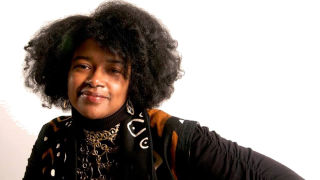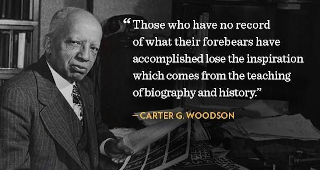Alumnus Keynote Highlights Black History Month Luncheon
Thursday, February 20th, 2020

Antoinette Ellis-Williams, Ph.D. presents keynote address at 2020 Black History Luncheon.
Antoinette Ellis-Williams, Ph.D., Chair and Professor of Women's and Gender Studies at New Jersey City University, will deliver the keynote address at the Black History Month Luncheon on Thursday February 27 at 11:30 a.m. in the Main Lounge of the University Center. Dr. Ellis teaches courses on Black Womanhood; Diversity & Difference; Women's Lives; Women & Leadership; Women, Hip-Hop & Social Change; Urban Men of Color; Race, Class, Gender Activism. She is also the author of Black Gardenias: A Collection of Poems, Stories, & Sayings From a Woman's Heart. Gardenias is a collection of poetry, short stories and sayings dedicated to women from many different areas of life and their struggles against and triumphant over various forms of oppression, including but not limited to sexism, racism and classism.
The national theme for Black History month 2020 is African Americans and the Vote.
In 1926, Dr. Woodson initiated the celebration of Negro History Week, which corresponded with the birthdays of Frederick Douglass and Abraham Lincoln. In 1976, this celebration was expanded to include the entire month of February, and today Black History Month garners support throughout the country as people of all ethnic and social backgrounds discuss the black experience. ASALH views the promotion of Black History Month as one of the most important components of advancing Dr. Woodson's legacy.
"The theme speaks, therefore, to the ongoing struggle on the part of both black men and black women for the right to vote," according to the Association for the Study of Afro American Life and History, the organization that founded Black History Month. "The theme of the vote should also include the rise of black elected and appointed officials at the local and national levels, campaigns for equal rights legislation, as well as the role of blacks in traditional and alternative political parties," the ASALH adds on their website.
This year's theme, African Americans and the Vote, also recognizes the centennial of the passing of the 19th Amendment, which gave women the right to vote. This year also marks the 150th anniversary of the 15th Amendment, which granted African American men suffrage after the Civil War.

Carter G. Woodson, Ph.D. founder of Black History Month Commemorations.
This national theme should prompt research on the long road to political freedom in the United States for the African American both enslaved and the ten percent who were free in the post Emancipation Proclamation period. The term "Black suffrage" referred to the movement to enfranchise that population and all subsequent actions directed at black people's right to vote. That right to vote, was, and still is being limited through official and informal means or excuses of preventing voter suppression fraud at every level of society. In other countries throughout history, all people including women, were able to obtain the right to vote through the course of national independence. Black men in the United States did not gain the right to vote until after the Civil War. In 1870, the 15th Amendment was ratified to prohibit states from denying a male citizen the right to vote based on "race, color or previous condition of servitude. "Black Suffrage" in the United States in the aftermath of the American Civil War explicitly referred to the voting rights of black men only. Black women still had many hurdles to face before obtaining this basic human right.
The passage of the 19th Amendment, which was ratified by the United States Congress on August 18 and then certified as law on August 26, 1920 technically granted women the right to vote. However, the 19th Amendment did not initially extend to women of African American, Asian American, Hispanic American and American Indian heritage because of widespread enduring inequality and racism from within the ranks of the women's suffrage movement. It wasn't until the Voting Rights Act was passed nearly a half century later, on August 6, 1965 that black women were officially allowed to exercise their right to vote.
As a result of their long fight to receive the right to vote African Americans, we see two long term consequences: one, African Americans cast their vote for the party that assisted them in their strides toward freedom, the Republicans. In 1960 their collective vote shifted to John F Kennedy and the urban policy oriented Democratic Party. Historically they participate in higher percentages than other groups. In recent national voting in 2016, 61.4 percent of the citizen voting-age population reported voting, a number not statistically different from the 61.8 percent who reported voting in 2012. The black voter turnout rate declined for the first time in 20 years in a presidential election, falling to 59.6% in 2016 after reaching a record-high 66.6% in 2012. The 7-percentage-point decline from the previous presidential election is the largest on record for blacks. (It's also the largest percentage-point decline among any racial or ethnic group since white voter turnout dropped from 70.2% in 1992 to 60.7% in 1996.)
Reflections by notable persons of African descent on the "vote:"
"Truth is powerful and it prevails." —Sojourner Truth.
"The Voting Rights Act was, and still is, vitally important to the future of democracy in the United States." —Coretta Scott King.
"In recognizing the humanity of our fellow beings, we pay ourselves the highest tribute." —Thurgood Marshall, first African American U.S. Supreme Court member.
"There can be no democracy without truth. There can be no truth without controversy, there can be no change without freedom. Without freedom there can be no progress." —Andrew Young, Former United Nations Ambassador
"We must continue to have voting rights in the state, not to politicize this, but they must have a voice in the rebuilding effort in the community from which they have been displaced." —Marc Morial, President and CEO, National Urban League
"My humanity is bound up in yours, for we can only be human together."—Desmond Tutu
For more information on the ASALH and the theme click below:
Categories: Arts and Culture






